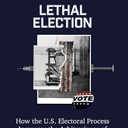A recent op-ed in the Florida Times-Union pointed to continuing problems in Florida’s death penalty system despite prior recommendations for change in an American Bar Association report three years ago. The article was written by Raoul Cantero III, a former Florida Supreme Court justice appointed by Gov. Jeb Bush, and Mark Schlakman, a senior program director for Florida State University’s Center for the Advancement of Human Rights. The authors state that little has been done by either the state government or the Florida Bar Association in response to the ABA’s findings. The ABA report addressed the often abysmal legal representation of defendants in post-conviction proceedings, socioeconomic and geographic bias in seeking the death penalty versus a life sentence, and lack of fairness and accuracy in the system. The authors note that these problems remain, but there is a chance that new political leaders could still bring about change: “The challenge for those who hold and aspire to elected office is to ensure that personal perspectives pertaining to capital punishment, and the public outrage arising out of heinous crimes, do not overshadow the fact that Florida’s death penalty process is fraught with problems. Floridians expect a system of justice that engenders confidence based upon fairness and accuracy. With regard to the state’s death penalty process, in many respects that standard has proven to be elusive.”
The op-ed noted that since 1973, Florida has exonerated more death row inmates than any other state. The entire editorial may be read below:
State’s death penalty system still ‘fraught with problems’
Three years ago, the American Bar Association released a Florida Death Penalty Assessment Team report that raised serious concerns about the state’s death penalty process.
Since then, neither the state government nor The Florida Bar Association has done much to remedy the problems.
To study Florida’s death penalty system, the ABA assembled a highly qualified eight-member team.
The report was developed after almost two years of research and analysis, and findings and recommendations had to be unanimous to be included in the report.
The report’s findings and recommendations were intended to improve the administration of justice in Florida and promote fairness and accuracy in our criminal-justice system without regard to one’s views on capital punishment.
‘Abysmal’
Among the report’s findings was that legal representation of death penalty defendants in postconviction proceedings is often abysmal.
The report makes several related recommendations, including reinstating the capital collateral regional counsel office in the Northern Region of Florida. Gov. Charlie Crist has expressed support for reinstating the northern CCRC office.
Another of the report’s major recommendations embraces a Florida Supreme Court opinion that called upon the Legislature to revisit the death penalty statute.
The report, like the opinion, observed that Florida is the only one of 35 death penalty states that allows a jury to decide that aggravating factors exist and to recommend a sentence of death by a majority vote.
Unresponsive
Despite the court’s strongly worded opinion, the Legislature has been unresponsive.
It was reported that Gov. Jeb Bush said that the issue was “definitely worth consideration” and cautioned legislators not to ignore the court.
Yet, Crist has voiced opposition to the recommendation.
Another alarming problem with Florida’s death penalty is the number of defendants on Death Row who have been exonerated.
Innocent convicted
The Death Penalty Information Center, a Washington-based nonprofit organization that provides independent analysis on issues concerning capital punishment, says Florida has exonerated more death-sentenced inmates than any other state since 1973.
One was exonerated after he died of cancer on Death Row.
The report also expresses concern about socioeconomic and geographic bias. Prosecutors from one circuit might opt for the death penalty while prosecutors from another might opt for life without parole.
As the 2010 campaigns for statewide office and the Legislature take shape, conventional wisdom suggests that both Republicans and Democrats will resist taking positions that could be perceived as anything but tough on crime and strong on the death penalty.
Circuit judges, who preside over capital cases, while nonpartisan and subject to the judicial canons, are not completely immune from such dynamics, since they also face the voters periodically.
Fairness, accuracy needed
The challenge for those who hold and aspire to elected office is to ensure that personal perspectives pertaining to capital punishment, and the public outrage arising out of heinous crimes, do not overshadow the fact that Florida’s death penalty process is fraught with problems.
Floridians expect a system of justice that engenders confidence based upon fairness and accuracy. With regard to the state’s death penalty process, in many respects that standard has proven to be elusive.
We hope that this election cycle will provide an opportunity to openly and honestly discuss these issues and possible solutions.
(R. Cantero & M. Schlakman, “State’s death penalty system still ‘fraught with problems,’ ” Florida Times-Union, Sept. 25, 2009 (op-ed)). See also Arbitrariness, Innocence, and Representation.



